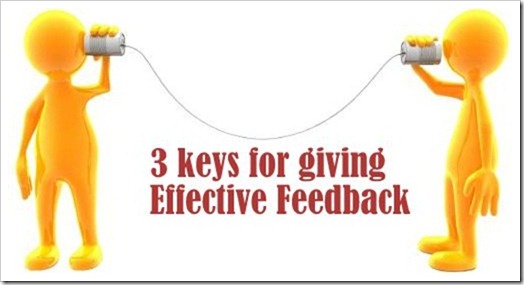3 keys for giving effective feedback
A month ago I was taking a session on “Team Dynamics” to a bunch of fresh out of college graduates. The previous day of the class, I decided to include the “Importance and Knack of Feedback” topic into the agenda. During the session, I made them go through a 10 minute group exercise to practice feedback. After going through the entire session, I enquired to the enthusiastic bunch how they felt about the session in general and in particular about the session on feedback. I wouldn’t say I was surprised when the group expressed their skepticism for the relevance and application of the group exercise as well as the topic. I wasn’t surprised because I felt the same a couple of years ago, when I myself was sitting in a class and was taught about the importance of feedback.
The inspiration for this article came the other day when I ran into few of the session’s attendees. They told me how in spite of their initial skepticism they were able to apply the feedback routine in their work.
Often we feel feedback is something which is given only by managers and supervisors to their subordinates. Sadly this isn’t true. In a rapidly evolving market with agile teams, responsibility and ownership is often divided between individuals irrespective of their position in the hierarchical tree.
In fact, most new organizations have realized the value of a horizontal organizational structure and given up the old hierarchical structure. There are many reasons we hesitate to give feedback. We worry about how the recipient would take it and would it possibly damage the professional bind with the person.
When giving feedback it is essential we focus on the individual’s behaviour rather than the individual’s character. I have often seen people being apologetic while giving feedback. This usually dilutes the message which is to be passed and the recipient walks away confused.
So, while giving feedback one should ensure the message is clear and timely. Feedbacks which are provided late seldom serve any purpose since many opportunities for improvement would be lost meanwhile.
While more and more organizations turn agile, crisp, timely and actionable feedback can help individuals to quickly work on their gaps and become productive.

Let me go through the 3 basic things any feedback message should contain.
Expected Action / Behaviour:
To ensure a crisp feedback, it is important to establish the context on which the feedback is given. The expected action / behaviour is the expectation the team had from the individual in the situation being discussed. This could be anything from completion of a task or communication of information.
Perceived Action / Behaviour:
How did the individual perform in the situation? What is the degree to which the actual behaviour different varied from what was expected (time/money/count)? Here I stress on the word “Perceived” to ensure that the feedback session is open ended and can encourage discussion. To encourage fairness and openness in the discussion always ensure the recipient is able to express his point of view.
The Result:
Maybe the last point, but the most important part of any feedback. A feedback is irrelevant if the actual action varied from the expected one, but didn’t have an effect on the outcome. So it is important for us to first understand and explain to the recipient what resulted in wavering from the expected behaviour. This could be anything from loss of revenue to waste of time.
I always learn faster when I can see an example or demo. So let me also give an example of a real life situation which demands feedback: Fellow colleague constantly coming late for meetings. “We were supposed to meet in XYZ meeting room at 9AM to discuss about the QSD Project. You turned up 30minutes late at 9:30. Since you were late, we couldn’t get your inputs and were thus unable to finalize on the project plan.” Simple isn’t it?
Do try it yourselves and let us know if this methodology helped you. And hey, don’t limit feedback to only negative traits. Feedback is an excellent instrument to let your colleagues know they are doing a great job, so that they can further fine tune their strengths.
Would love to hear your thoughts in this…
